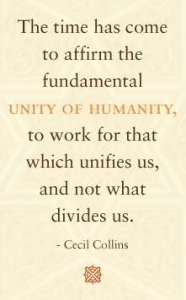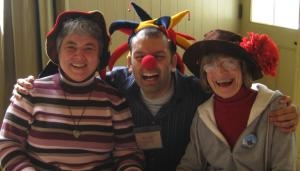Sacred At The Center: Four Days With Kalliopeia

It was an exquisite 4-day gathering of 160 friends of the Kalliopeia Foundation. Wide range of leaders from 13 Indigenous Grandmothers to former chair of the Kellogg Foundation to a reknowned Yale professor to the founding board chair of the Parliament of the World's Religions to UN leaders to celebrated authors to fierce grassroot activists to former Director of Amnesty International to even an Eskimo elder from the North Pole! Truly diverse group, all connected via their fundamental committment to inner transformation and oneness.
 On my way to the conference, I offered a ride to two folks. First was Slobodan. As he was giving me directions on the cell phone, he tells me that we had met at Karma Kitchen three years ago. Small world. It turns out he started theatre at the age of 7, and managed to get kicked out of Yugoslavia when he started his own social-change public theatre company at the age of 16! For more than 50 years, he's been doing theatre and art. [With a "thank you for the lift", he offered this wonderful doodle on the right!]
On my way to the conference, I offered a ride to two folks. First was Slobodan. As he was giving me directions on the cell phone, he tells me that we had met at Karma Kitchen three years ago. Small world. It turns out he started theatre at the age of 7, and managed to get kicked out of Yugoslavia when he started his own social-change public theatre company at the age of 16! For more than 50 years, he's been doing theatre and art. [With a "thank you for the lift", he offered this wonderful doodle on the right!]
Just as Slobodan's humorous stories were kickin' in, we made another stop to pick up Parker Palmer. He works at the intersection of "soul and role", particularly helping teachers stay connected to the spirit of service that often inspired their journeys to become educators. At the time, I didn't realize that Parker had written more than half a dozen books or that he was named one of the thirty most influential leaders in education or that he was on Bill Moyers, :) but it was quite clear that underneath his affable presence was a life dedicated to some deep work. "We learn to listen to our inner voice, but you know, that's not always the absolute truth," he said smilingly. All three of us got a good laugh at that one. "This work is more like gardening, than manufacturing. It takes time. There is no quick fix." "In Quaker circles, we sometimes speak in many languages. And the practice is to listen to the space where the words come from." Immediately, I loved this guy.
Even before I actually made it to the retreat, I was inspired! In fact, I had agreed to attend this gathering almost a year ago, without even knowing what it was about. I really liked the organizers, so I just told 'em that I'd be happy to be useful in whatever way was helpful.
Chief Oren Lyons. He opened the conference. Something should be said about him, because he's a venerated 80-year-old leader of the Onondaga nation. He carries a heavy burden of his Iroquois people, who have unjustly suffered for generations. "In 1493, Pope Alexander VI issued a doctrine that declared that lands were 'unoccupied' if it didn't have Christians. People ask me what I want, and I say that I want a confession from the Pope. Nothing less." And yet he doesn't take himself too seriously, smiles a lot, and delivers a lot of wisdom. "When we are climbing the mountain of enlightenment, we can't go with all our luggage. We must divest. We must share, give." I had the sense that I wanted to help him somehow; I didn't know exactly how, and so one time, as I saw him walking with a heavy bag, I offered to lift his bag. We had an endearing conversation, about his Salsa lessons :) to the state of Lacrosse, technology and youth. At a later point, he affectionately tapped me on my leg and said, "I like what you said in there [about giving]. I practice that too."
 Kalliopeia Foundation, like few others, is deeply rooted in spirit. Barbara Sargent, its founder, said it well: "I wanted to create a foundation with the sacred at the center. Love comes first. That's what brings us all together." To honor the subtle, they even had a policy of not clapping. I'm not sure how many people understood the nuances of that practice, but I very much appreciated that. In fact, the organizers nurtured the subtle in every which way. Having been to many conferences, this is perhaps the only time that I've experienced such care put into the minutest details.
Kalliopeia Foundation, like few others, is deeply rooted in spirit. Barbara Sargent, its founder, said it well: "I wanted to create a foundation with the sacred at the center. Love comes first. That's what brings us all together." To honor the subtle, they even had a policy of not clapping. I'm not sure how many people understood the nuances of that practice, but I very much appreciated that. In fact, the organizers nurtured the subtle in every which way. Having been to many conferences, this is perhaps the only time that I've experienced such care put into the minutest details.
After the opening, four people were invited to share stories of emergence. Originally, they asked me to be on that panel, but then they weren't sure if they'd have time for five stories, so I happily volunteered to opt-out. But then, even though there was absolutely no time, Barbara Sargent pulled a fast one: "I was supposed to go next, but I'd like to ask Nipun Mehta to speak." No! Right now? Yes. I accepted the mic from Barbara, shared a story and then paused: "Should I share more?" She said yes, and I continued to share my journey of giving, receiving and dancing.
Perhaps because my talk was somewhat spontaneous, or perhaps because of the nature of the stories themselves, everyone laughed a lot and there was a palpable happiness in the atmosphere. Like many talks before, I never once mentioned the word CharityFocus. :)
At these kinds of gatherings, you never know who you'll run into. Quite literally, the person behind me in the lunch line was Jack Kornfield. I didn't know what he looked like, but I've certainly quoted him in the past. :) Based on a story I had shared on stage, he offered a beautiful anecdote from his own life:
Many years ago, three of them were visiting Thailand -- father, mother and their six year old daughter. Father, having been trained as a monk and set to be on a path to becoming a celebrated Buddhist teacher, tells his daughter that she has to make an offering to the people in orange robes (monks) who come by every morning. So she does. Right after, the six year old turns to her Dad and asks, "Can I make another offering tomorrow?" With a gentle pride, the father says, "Sure." To which the daughter responds, "But we have to buy the best stuff for them." And that meant that the monks got candies the next day. :)A lot can be learned from such spontaneous conversations. Raine Eisler shared about "caring economics" and asked: "If we pay $80/hour for plumbers, why are just paying $10/hour for child care?" In another conversation, I learned that Temples of Malta all face in the direction of Africa -- perhaps there is something deeper about sacred architecture. A woman, who helped start Americorps, recommended a book named 'Geography of Bliss'. In a session on community, I heard a cool description of the ripple effect: "activities with unrelated generative effect." A Native American activist shared his frustrations of building community: "We taking away the people's watches, and then ask them what time it is." Founder of the Biomimcry Institute, Byrony Schwan, gave me a postcard that read: "How would a butterfly inspire your next design?"
 At this gathering, I also reconnected with a bunch of old friends. Michael Lerner, for example. A MacArthur "genuis", he has just done lots of work, particularly around serving cancer patients. In 2007, he had interviewed me, over the telephone. Right as we met, there was a sense of a "noble friend". We carved out some time to go on a hike to see the "best view of the Golden Gate" in the Bay Area, and shared lots of possibilities of co-creation. One of them includes him becoming a part-time DailyGood editor. :)
At this gathering, I also reconnected with a bunch of old friends. Michael Lerner, for example. A MacArthur "genuis", he has just done lots of work, particularly around serving cancer patients. In 2007, he had interviewed me, over the telephone. Right as we met, there was a sense of a "noble friend". We carved out some time to go on a hike to see the "best view of the Golden Gate" in the Bay Area, and shared lots of possibilities of co-creation. One of them includes him becoming a part-time DailyGood editor. :)Of course, amidst all of this activity, there's always the moments of absolute serendipity -- like the evening when I was in my room, checking emails before dinner. A friend of mine was turning 60 and he sent an email inviting a few of us to go to Assisi, because St. Francis was a major inspiration in his life. I responded to his note, meditated for a bit, and then headed to dinner.
At dinner that evening, lo and behold, I ended up sitting next to two Franciscan nuns! Sister Carmen, from the barrios of Nicaragua, had started a group with the third woman next to us -- a feeble-yet-radiant Unitarian minister (and a practicing clown), Rev. Kay Jorgensen. Faithful Fools. That's what they called themselves. They do "street retreats", where participants spend a week on the streets of San Francisco; they serve the homeless populations directly, and do a slew of other small programs. If you ask them, though, they'll say that they don't know what they're doing. "We're fools," Kay jokes with her red clown-nose. "We don't have staff. We have jugglers."
 They found their offices, by walking on the streets one day and going -- quite literally! -- where the wind blows. If there were to be "God's People", these would be among the top of the list. We laughed a lot, even when no one was sharing a joke. :) Everyone had left the dining room, but the four of us kept going with our stories. Such innocence, such joy, such beauty, such big-hearted service. They had no idea who I was or what I did, but they indoctrinated me into their clan of fools by gifting me a red clown-nose. "Fool Nipun", they would now refer to me with affection. :)
They found their offices, by walking on the streets one day and going -- quite literally! -- where the wind blows. If there were to be "God's People", these would be among the top of the list. We laughed a lot, even when no one was sharing a joke. :) Everyone had left the dining room, but the four of us kept going with our stories. Such innocence, such joy, such beauty, such big-hearted service. They had no idea who I was or what I did, but they indoctrinated me into their clan of fools by gifting me a red clown-nose. "Fool Nipun", they would now refer to me with affection. :)The next day, I opened my keynote with that clown nose and the importance of not knowing. Lots of beautiful ripples. One that touched me was the A/V technician staffer, Gil, who came up to me at the end and said, "Hey man, of all the talks I've heard in this room ... I really liked your talk. I got what you were saying! Thanks for your work." I could tell that it took a lot of courage for him to come up and tell me that, so I thanked him in return.
Sometimes the heartful moments were simply a result of just listening to someone else's story. Kawne Scruggs, from the hoods of Ohio, remixes ancient stories to the beat of African drums, to infuse young people's lives with a broader context; after a heartfelt conversation, he came up to me the next morning, hid a wristband in his plams, and shook my hand: "Hey man, I just wanted to say thanks. No, really, I mean it." At lunch, Linda Lantieri, a longtime principal in New York, shared some stories of bringing the power of inner-life to education; she later sprung up behind me and just slid a copy of her book -- Schools with Spirit -- underneath my hand and whispered "thanks". Here's one of those stories of teachers creating 'Peace Corners' in their classrooms:
Within the first week of starting a 'Peace Corner', a student started using it. There's a 10-minute sand timer, which can be used twice. So this student spends 10 minutes, and then flips over the timer immediately for another 10 minutes. Later in the day, I asked the student if everything was okay. It turns out that his uncle died after a long battle with cancer. Unfortunately the family couldn’t afford the travel costs to attend the funeral, so he went to the funeral instead. And it was weighing heavily on him. The simple addition of a Peace Corner in the classroom allowed him (and subsequently, many others) a safe space to regain his balance.In another conversation, Parker Palmer (whom I spoke of earlier) shared a story of his father's passing:
My father was a very kind person. After his funeral, I remember, going to the dry-cleaners to pick up his unclaimed laundry. The man behind the counter was saddened to hear of his passing and told me, "Every time your father came in, he would do something to make us all feel better." A few years later, I created my own version of a Smile Card, that I would give whenever I'm deeply touched by someone's spirit. Take a look [as he took out a bill from his wallet]:
Rather generously, he said that I reminded him of his father. During dinner, I brought dessert for a bunch of people on the table -- which included Parker. When he kindly thanked me, I joked: "You know, I'm just trying to earn that dollar of yours." :) Sure enough, right before he left, I got an envelope with that dollar and a handwritten inscription from Parker: "You won my heart, truly you did!" Its the kind of stuff that Mastercard might call "priceless".
The elegant programming of the conference surely facilitated such priceless moments. Melanie Demore's chant "Sending You Light" had me in tears, Nina Wise's one-man performance had us all laughing for half an hour straight, Drew's poetry mesmerized while Paul Taylor's Australian didgeridoo had us vibrating at a new frequency. Pir Zia Inayat Khan's talk was emblematic of a true Sufi teacher (and it turns out that he's a quarter Indian and his ancestors and mine were from the same city) while Mary Eveyln Tucker's powerful keynote filled everyone with vision and hope. "Evolution is simply waves of gratitude," Mary Evelyn said. And at random times, people like John Fox -- from Institute of Poetic Medicine -- would bust out with long, memorized poems that would infuse the butterfly-named halls with radiance. Because everyone in the room was a leader, you just never knew when inspiration could've struck.
With my buddies Orland Bishop and John Bloom, I also hosted a discussion on "Rethinking Money". We barely scratched the surface, but there were lots of great questions: What is the root of money? What does it take to get social capital to work? Why don't more people use volunteerism? What about alternative currencies? How do I embrace the gift economy? What is privilege? Should non-profit workers be paid as much as for-profit workers? How do you navigate the issues around race and money? Can acts of caring be valued? Do we really value everyone's time equally? Rich discussion, that some people continued for couple of hours after. :)
The stories went on and the gifts kept circulating fluidly.
You never know how gifts will travel and in what form they might come back to you. Bob Stigler gifted me a copy of a book, which included my own blog entry from 2007! At another conversation, two folks were talking about a book. "Have you read Value of Nothing?" "No." "It's quite interesting. You would love it." Sure enough, I went to my room, emailed CF's "secret service" team to tag that person with the book. Interestingly, that man ended up gifting me a copy of his own book -- Genius of Money -- before our tag reached him. :) For Judy, a Brahma Kumari nun, the message of the gift-economy came to her at absolute the right time -- just as Images & Voices of Hope was at a major cross roads. She tagged me with her book, Something Beyond Greatness, with a kind inscription of: "To the Agent of my Epiphany". On the last day, Lydia was almost in tears when we spoke -- because she randomly picked up a Peace Chain with 'Fred', which was her father's name. Her father had passed away when she was young; she had no idea that his name meant 'Peace' in Norwegian. She too felt moved to turn her art school in Vermont towards a gifting paradigm, and she started the process by gifting me one of her delightful art pieces!
So many more stories and deeply fulfilling encounters filled my days. I'll stop the blog entry here :) but surely, the gifts will continue rippling.
Right as I was leaving, I ran into Grandmother Aggie. She's part of the 13 Indigenous Grandmothers from around the world, who all had a similar vision to come together and pray in areas of strife around the world. In her usually eloquent way, she shared her wisdom: "Ultimately, I learned this -- what's meant to be is what will be. You can't fight that." I told her that in India, we touch the feet of our elders to seek their blessings. She smiled, I touched her feet, she shared a blessing, I smiled and said goodbye.
With a bow of gratitude to all that made this gathering possible ...
Posted by Nipun Mehta on Mar 24, 2010
SHARE YOUR REFLECTION
6 Past Reflections


On Mar 24, 2010 Yoo-Mi wrote:
What an amazing experience - thank you for sharing the inspiration!
Coincidentally, am reading a fictionalized account of the life of possibly Pir Zia Inayat Khan's aunt, Noor Inayat Khan, a resistance fighter during WWII and connecting with the messages of love and tolerance of Sufi teachings.

On Mar 26, 2010 Neil wrote:
What a fantastic event! Thanks for sharing the experience, it's inspirational to hear about these everyday heroes from all walks of life.

On Mar 27, 2010 Aditi wrote:
Wow - this sounds like it was an amazing retreat with so many inspiring people! I love the $1.00 heart smile card!

On Mar 29, 2010 Darlene Markovich wrote:
Dear Nipun,
Thank you for this sharing from the heart. Through your good work I feel closer to the movement of true expression, which I think is, perhaps, true love.
Darlene



On Mar 24, 2010 Rod wrote:
Thanks Nipun for sharing your experiences:)
You posted enough inspirational stories to last a lifetime. Too bad all readers of your blog could not have attended the event in person.
Will there be transcriptions of the presentations or videos of events to share?
I especially liked the idea of a 'Peace Corner' in classrooms. Perhaps we should all create one in our homes, offices, White House, and congressional chambers:)
Love and Peace
Rod
Post Your Reply